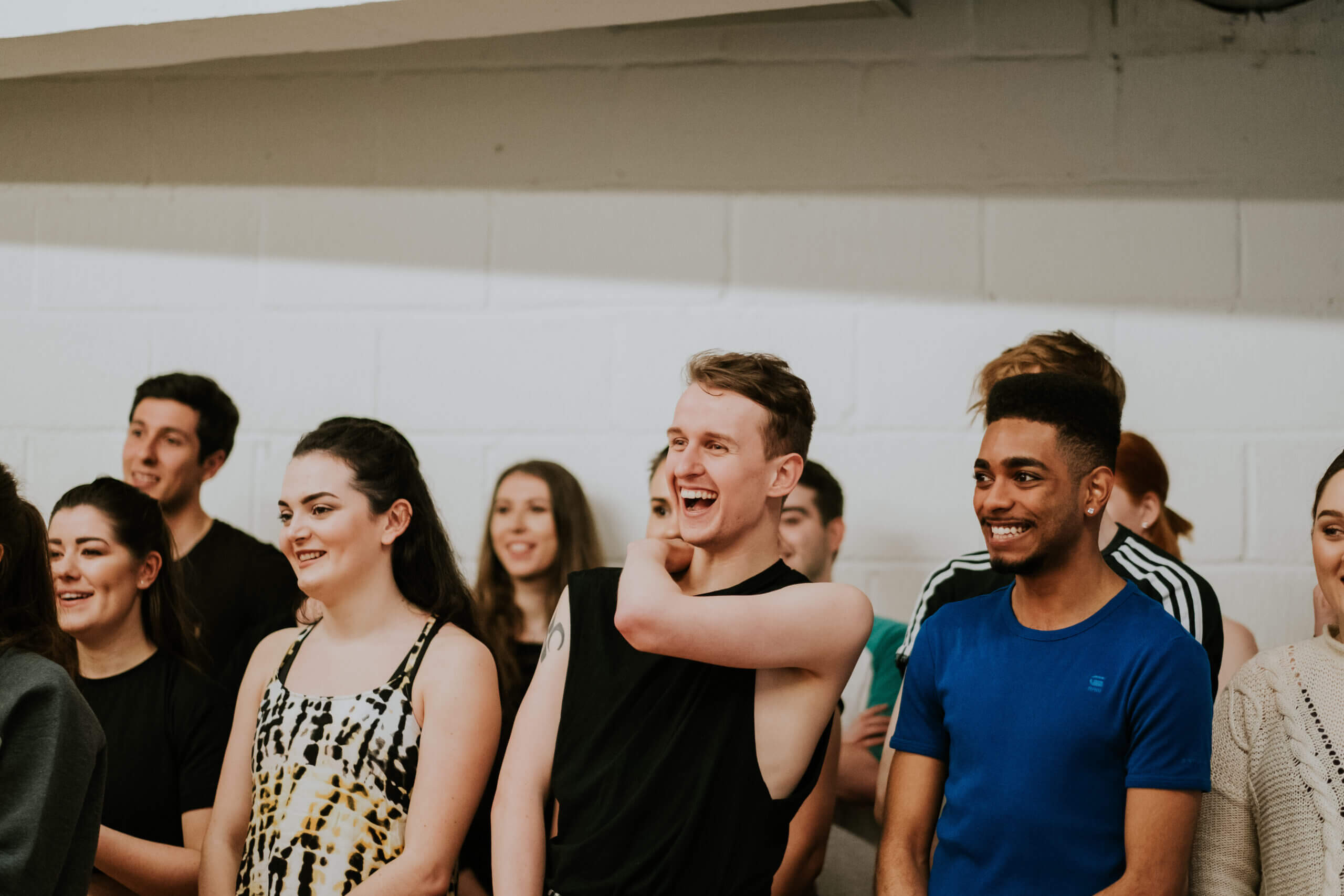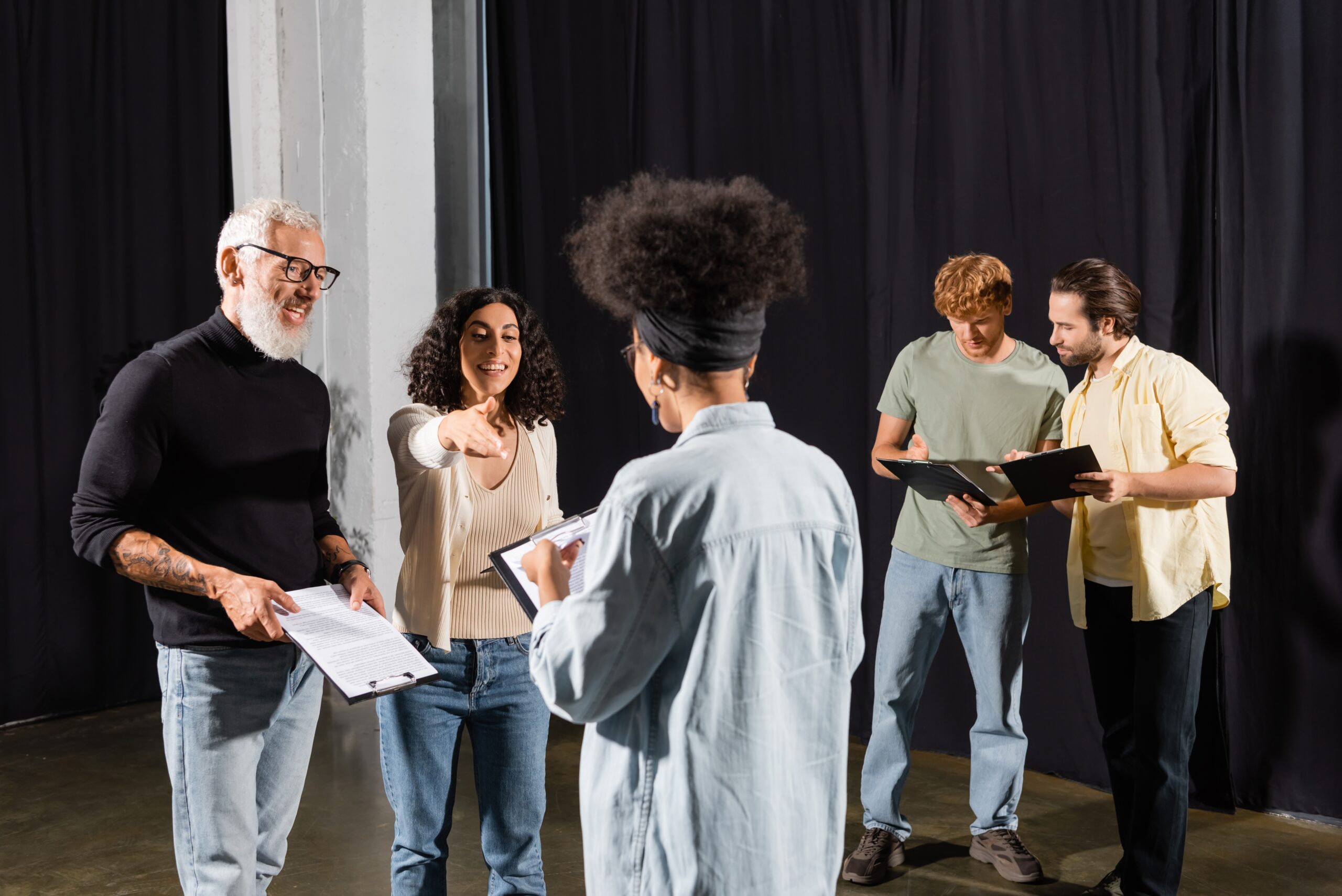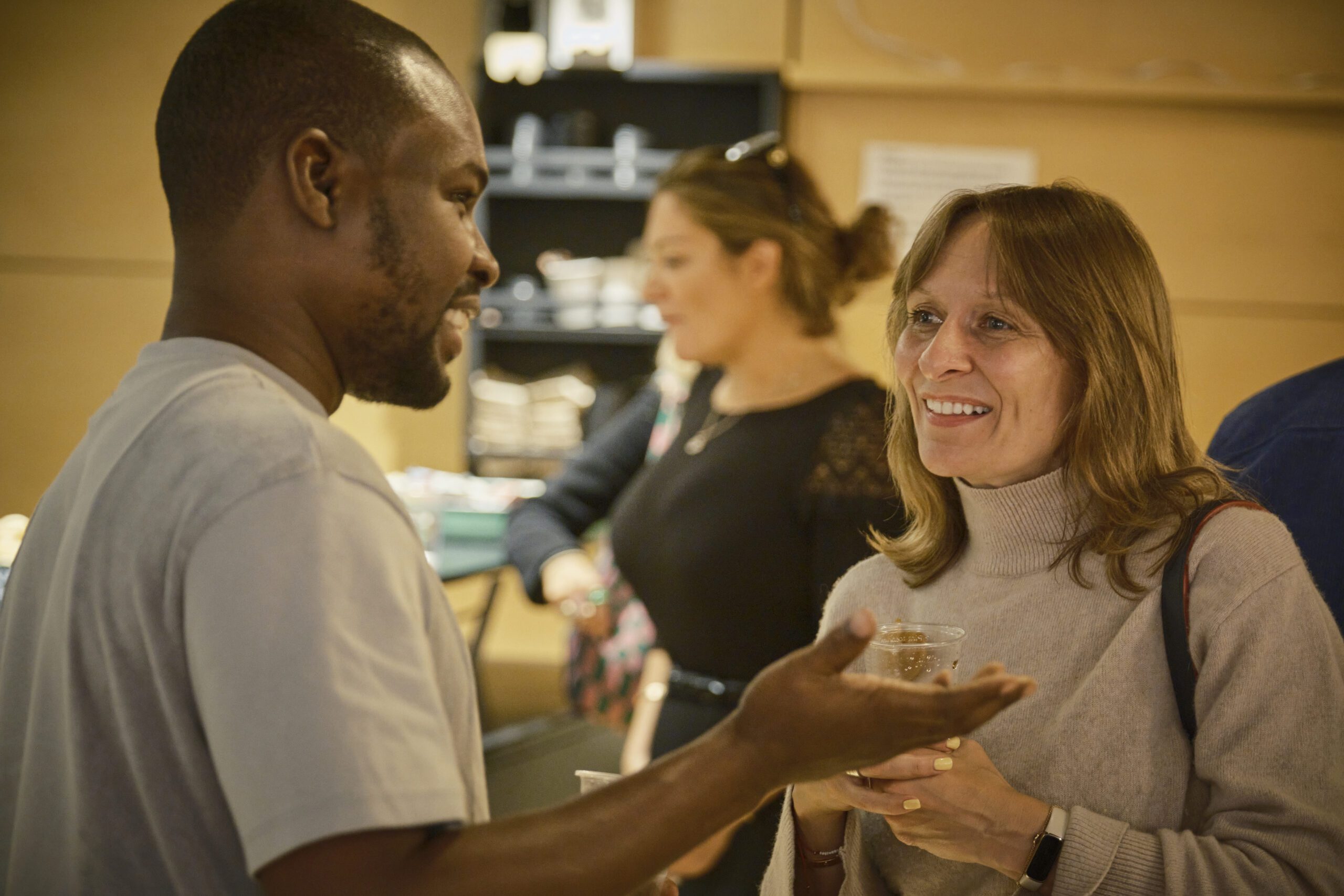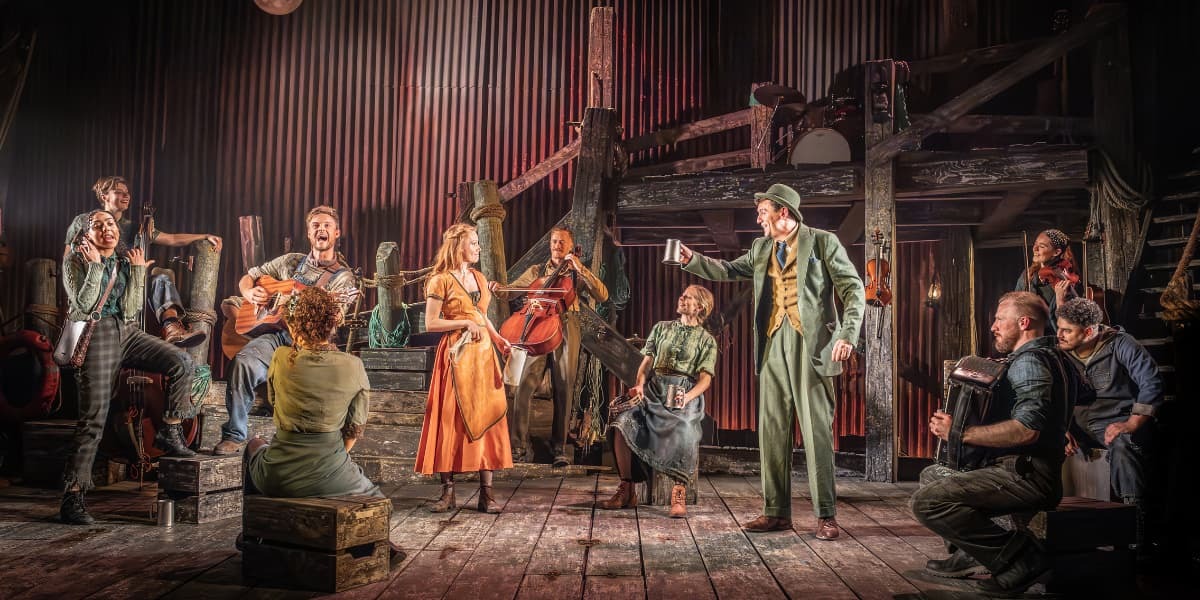Five practical tips for being funny and improvising well.
As recently shared while teaching ‘Comedy for Actors’ for Spotlight, improv is a really useful tool – whether trying to be funny or get booked.
Oddly, to be funny, you don’t actually have to try. Don’t try to be funny, sexy, or clever – because you already are all those things. When people, especially those new to comedy, try to be funny, it has the same effect as getting someone to like you on a date. You can see it, hear it, maybe even smell it – the desperation – and it does nothing but put the date/audience off.
Instead, by doing things like improv and removing self-judging filters, you can learn to embrace the comic genius, artist and poet you already are by sharing a wonderfully weird, authentic you. There must be some reason your friends hang out with you! But how can you share your comic gifts with the world? Where do you start?
No person is an island. What’s the point of being hilarious if there’s no one there to laugh? We need people to enjoy life, to feel good about ourselves, and to feel alive through connection. Comedy Improv – the sport of the nerds – is a joyous team effort with one golden rule: make your scene partner look good. There are improv communities in every city in America, and you should be able to find one near you in the UK, too.
You cannot make it up wrong. As I was taught by Ali James (SHOWSTOPPER!) and the director of the Southend 48-hour Improvathon (an unscripted musical that lasts two days), there’s no ‘right or wrong’ in improv, only ‘clear’ or ‘unclear’. You can’t get it wrong, so don’t judge yourself or others – act as if that’s exactly what was supposed to happen.
But how do you make up more good things than bad? The answer is simple – be the best listener. Have your teams back by listening to them so intently; it’s like you’d get £1 back for every correct word you repeat verbatim (a teaching technique I stole from Chris Mead, Hoopla).
There are no rules in improv – only tools. It is, after all, just making stuff up, but after almost a decade of doing it, here are the five tips I find most useful:
-
Active Listening
When someone remembers your name, pronounces it correctly and goes one further and remembers where you’re from, your hobbies or how you take your coffee – you feel good. You feel valued. They took the time to actually listen to you with such focus that they could remember it – and their time, just like yours, is incredibly valuable. This is active listening – a superpower that will help you on stage and set and in your personal life and networking scenarios.
On stage or set, when you remember minute details and repeat them back later, the audience is always impressed. Reincorporation is comedy gold and makes you come across as both funny and clever – both of which are incredibly appealing – and sexy!
When you don’t listen, it usually means your mind is distracted, possibly because you’re thinking of ways to prove yourself. Then, because you didn’t listen, you’re going to say things that make no sense, which can turn your date off, get you nowhere with your improv team and all you’re left with for quick laughs is to roast those around you, talk about sex, poop, or someone’s mother. You’re left judged instead of respected.
As Lee Tearrell (Comedy Store Players, The Laughter Academy) once told me: “You cannot control the sea. You can only learn to swim in it.”
Trying to be funny is like trying to control the sea. Improv requires that leap of faith. There’s a reason most stand-ups have troubled pasts – it’s because being able to make people laugh saved them, so they got good at it really early on to protect themselves. This is not ‘Fight, Flight or Freeze’ – you are not alone on stage, on set or in a scene. It is also not all about you.
Vulnerability is another superpower because it’s your authenticity that your scene partner and your audiences connect with (however odd you think you are), so just be yourself. Improvising in a safe space, where everyone has your back, will allow you to get more comfortable and feel relaxed enough to focus on your scene partner instead of yourself – don’t try to be funny; listen and support. A happy side effect is that you will often become more confident in yourself– which helps with everything. You will also often feel more connected to those around you – the more you listen, the more you learn.
-
Truth in Comedy
Genuine reactions are always the best in improv, comedy writing, and acting lines from a script. I value the Meisner Technique (and recommend Alex Marx Meisner if you live in London). In comedy, it’s no different – your real reaction is still the best and often the funniest, even if you’re in character as a talking dolphin at the time.
Whether it’s your truth or the truth of someone you know well, truth is always more interesting than the lie and much more enticing to watch. A scene where two friends discuss their real opinions of Galaxy versus Dairy Milk draws us in much more than a scene of two aliens naming parts of their ship because we don’t care about stuff. We care about people, emotions and relationships. So speak your truth, whether it’s stand-up, a sit-com or improv. Whether the audience agrees with it or not, it will be funny to someone, educate someone else and make someone else feel seen.
-
Talk Less, Show More
Think of the character, ‘Mr Bean’. He’s universally loved because physical comedy (clowning) is an almost universal language (with a few exceptions, like the thumbs-up gesture meaning ‘great job’ in the UK and ‘up yours’ in Italy). Gurning, eye-rolling, slapstick – even just a well-timed look – can all have audiences roaring with laughter without you ever saying a word.
Start your scenes or auditions in silence: “Listen with your eyes,” and you’ll be able to judge better, react accordingly and seize the opportunity to set up laughs for later. Think of this as hiding Easter eggs. For example, a mime throws a banana skin on the floor for someone to slip on later. This works for scripted scenes as well as improv. It allows time for eye contact or for characters to notice the lack thereof, which is how most humans check in before they speak. “Eyes, eyes, eyes,” you will hear a lot in improv.
Physically reacting to the space and everything in it (kinaesthetic improv), in silence or to music at the start of a scene and continuously throughout is done by TJ and Dave, who improvise entire plays (shows on Vimeo). It’s still being taught by teachers such as Jeff Michalski (LA), who I highly recommend (he has upcoming workshops across Europe).
Fundamentally, it is this that needs to be changed. React to everything in the space and how that could affect you/your character, from your scene partner’s eye line to the proxemics between you to the sounds outside the window – if you play the truth of each moment, everything seems natural and purposeful – nothing feels fake or out of place, because everything is being created from what is actually in front of you – no writing or imagination needed. This makes everything seem purposeful and authentic – audiences can’t pick out anything unnatural, so it reads like improv magic.
-
Accept and Build
The infamous “Yes, and…” or, better put, “Accept and build” method is the foundation of improv. No scene can be created if every idea is blocked. All you’ll be left with is two unknown entities in an unknown place arguing – no one and no narrative for the audience to care about. When you agree, your ideas start to create a world around you. So will the audience if you care about that world and your relationship.
So be open to agreeing, even if the scene is not what you thought it would be. As well as verbally agreeing, you can also physically and emotionally agree with someone – all it takes is to notice and copy the pattern. Notice and match the vibe – accept it and build on it. Matching their physicality and emotion makes you peas in a pod, which is enticing and incredibly watchable. If it doesn’t make sense for your characters to come from the same point of view, think about what the scene needs. Often, the person coming in and breaking the pattern provides the joke.
You can accept the premise and build the world whilst saying no, though – if you, the improviser, dislike an offer, you can reject it while acknowledging it was made, for example: “Now we can make out,” can be accepted and built on with “No, not now, my dad is in the next room.”
You have acknowledged the offer, but if you don’t want to kiss on stage, you can build on the offer by adding reasons why you can’t, keeping you, the actor, safe. You also always have the option to leave the stage; your team will have your back and justify it.
-
Commit
When you feel awkward, the audience will feel awkward. So, whatever you’re doing in the audition room, on the self-tape, or on set or stage – commit to it. Go all in! It’s easier as a director to tell people to tone it down than to try and get more out of someone. Energy is a top commodity. Even if you are telling a joke that isn’t funny, people will laugh if you own the hell out of it. Giving it your all will make you memorable, too – and could make casting directors call you in again.
Improv is so good for actors. Even when working with a script. Yes, the lines aren’t ours, nor are the costumes, the set, the characters or their relationships, but those real glimmers – that chemistry, that real pain or delight or longing – wins us the awards. Improv can encourage us to go out of our comfort zone and take chances on every show or take.
My advice to all actors is this: seek out and practice improv as much as possible. It will help you to be a better actor and, more importantly, learn to be a better, more confident person. Being in a room full of other people who have your back is extremely fun as well. In this highly competitive industry – find your tribe!
For improv classes in London or online, sign up at www.hooplaimpro.com – it offers scholarship places for those who might need them.
![]() Lisa Lynn is an award-winning actor, improviser, singer and director who hosted a workshop for our latest open house. Just back from the USA, she is a regular on the London improv circuit, as well as a Teacher at UK’s largest improv school, ‘Hoopla impro’. You can find her upcoming intensives and courses (including ‘Improv for Actors’ May 11th and 12th 2024) on her website, www.lisalynn.co.uk, see her perform in an improv musical at www.acaprov.com, or sign up to Lisa’s free Spotlight webinar on ‘Creating Characters’, Tuesday March 19th 2024 at 6pm. She’d like to thank everyone she’s ever watched or improvised comedy with for helping shape this article.
Lisa Lynn is an award-winning actor, improviser, singer and director who hosted a workshop for our latest open house. Just back from the USA, she is a regular on the London improv circuit, as well as a Teacher at UK’s largest improv school, ‘Hoopla impro’. You can find her upcoming intensives and courses (including ‘Improv for Actors’ May 11th and 12th 2024) on her website, www.lisalynn.co.uk, see her perform in an improv musical at www.acaprov.com, or sign up to Lisa’s free Spotlight webinar on ‘Creating Characters’, Tuesday March 19th 2024 at 6pm. She’d like to thank everyone she’s ever watched or improvised comedy with for helping shape this article.



















